
If I tell you the plot of this story it’s going to sound like a laundry list of anime and manga clichés. But in this case there’s a good excuse: this is the story where many of these clichés originated. As is often the case, the original is better than most of its imitators.
-
Original TitleMezon Ikkoku (The House of One Moment)
-
GenresRomantic Comedy, Slice of Life
-
DemographicSeinen
-
Contents96 episodes on 24 DVDs
-
LanguagesEnglish, Japanese with subtitles
-
Based onA manga by Rumiko Takahashi
-
DirectorKazuo Yamazaki
-
Animation StudioStudio DEEN
-
BroadcastFuji TV, 1986-1988
-
Region 1 PublisherVIZ Media
In the course of her long career Rumiko Takahashi has created an number of very popular and long-running manga series, many of which have had an unfortunate tendency to drag on forever without ever coming to a satisfactory conclusion. This one is different from most of her other works. It is not a raucous farce like Urusei Yatsura or Ranma ½. It is not a dark historical fantasy like InuYasha. Instead it is a gentle, low-key, slow-moving romantic comedy, with neither magic powers nor combat sequences. Allowing for some comedic exaggeration it probably gives a fairly accurate depiction of life in Japan in the 1980s.
It does come to a satisfactory conclusion, though it takes a while. (The series covers a period of about six years, during which the characters age at a normal rate.) However the main reason to watch a series like this is not to rush through to the ending, but to enjoy the witty writing and the somewhat odd but mostly likable characters.
As one might expect, the artwork has an old-fashioned look. This is a product of an earlier era, when animation meant assembling each frame from hand-drawn strips of celluloid. The character designs have a simple, round-faced “cartoony” look that was popular at the time. This is not a big-budget production, but some of the animated sequences and backgrounds are very nice.
Parental Advisory
This series is not aimed at young children. It contains mild sexual humor of a sort that will probably not shock anyone who has watched much American prime-time television (but remember that Japanese television has a more casual attitude toward nudity). Parents may be more concerned by the irresponsible behavior of some of the characters, including heavy drinking, though these characters are not presented as particularly admirable. Young children may be bored by the show, but if they are not some parental guidance may be advisable.
Premise and Characters
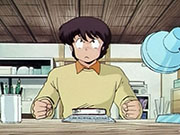 Yusaku Godai is a ronin, which in this case means a student who has failed his college entrance examinations, but is not yet ready to give up. He decides to move to Tokyo and enroll in a cram school full time, in the hope of qualifying for a college next year.
Yusaku Godai is a ronin, which in this case means a student who has failed his college entrance examinations, but is not yet ready to give up. He decides to move to Tokyo and enroll in a cram school full time, in the hope of qualifying for a college next year.
Godai (as everyone calls him) is a likable but sometimes infuriating main character: well intentioned but inept, indecisive and rather dim. The main things that he has going for him are youth and good looks.
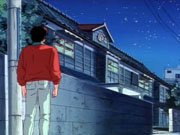 Since his funds are limited he moves into a run-down old rooming house called Ikkoku-kan (the word mezon is used only in the title.) The other tenants turn out to be a rowdy and thoughtless bunch who find numerous ways to make his life miserable.
Since his funds are limited he moves into a run-down old rooming house called Ikkoku-kan (the word mezon is used only in the title.) The other tenants turn out to be a rowdy and thoughtless bunch who find numerous ways to make his life miserable.
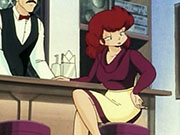 Akemi Roppongi lives in the room next to Godai’s. She works as a cocktail waitress in a nearby bar. During the day she wanders around Ikkoku-kan wearing a filmy negligee. She likes to organize drunken parties, which are usually held in Godai’s room, making studying difficult.
Akemi Roppongi lives in the room next to Godai’s. She works as a cocktail waitress in a nearby bar. During the day she wanders around Ikkoku-kan wearing a filmy negligee. She likes to organize drunken parties, which are usually held in Godai’s room, making studying difficult.
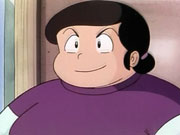 Hanae Ichinose lives in an apartment downstairs. She likes to attend drunken parties in Godai’s room where she will demonstrate how to dance and shout at the same time. During the day she likes to drink.
Hanae Ichinose lives in an apartment downstairs. She likes to attend drunken parties in Godai’s room where she will demonstrate how to dance and shout at the same time. During the day she likes to drink.
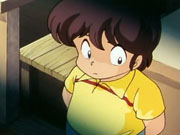 Kentaro Ichinose is a cute little boy, but apparently his mother has not found the time to teach him proper manners.
Kentaro Ichinose is a cute little boy, but apparently his mother has not found the time to teach him proper manners.
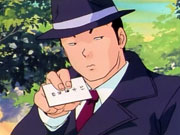 Mr. Yotsuya lives in the room on the other side of Godai’s. He is a very mysterious fellow. No one knows what his first name is or what he does for a living. However he is quite sociable and will often crawl into Godai’s room through a hole that he has made in the wall. From there he will peek at Akemi through a hole that he has made in the other wall. He also likes to borrow food from Godai and attend drunken parties.
Mr. Yotsuya lives in the room on the other side of Godai’s. He is a very mysterious fellow. No one knows what his first name is or what he does for a living. However he is quite sociable and will often crawl into Godai’s room through a hole that he has made in the wall. From there he will peek at Akemi through a hole that he has made in the other wall. He also likes to borrow food from Godai and attend drunken parties.
 Godai is fed up and prepares to move out, but then the building’s manager quits and a new manager arrives. Godai is entranced and forgets all about leaving.
Godai is fed up and prepares to move out, but then the building’s manager quits and a new manager arrives. Godai is entranced and forgets all about leaving.
Kyoko Otonashi is not only beautiful but also sweet and helpful and kind. She also is competent and self-reliant, has a fierce temper, and can be very stubborn.
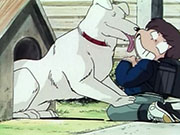 Mr. Soichiro is Kyoko’s dog, a big, stupid, affectionate mutt.
Mr. Soichiro is Kyoko’s dog, a big, stupid, affectionate mutt.
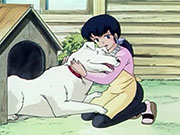 Kyoko doesn’t exactly spoil him but she does tend to talk to him as if he were a human being.
Kyoko doesn’t exactly spoil him but she does tend to talk to him as if he were a human being.
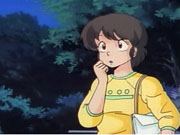 While working at a part-time job, Godai meets Kozue Nanao, an impressionable high school student. She decides that she wants him as her boyfriend. Clueless as usual, Godai is not sure he understands what she is getting at, or what he should do about it.
While working at a part-time job, Godai meets Kozue Nanao, an impressionable high school student. She decides that she wants him as her boyfriend. Clueless as usual, Godai is not sure he understands what she is getting at, or what he should do about it.
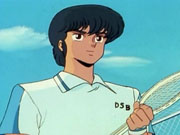 “Coach” Shun Mitaka works as a tennis instructor at a nearby club. He is actually fairly rich, with sophisticated tastes and devastating good looks. He is accustomed to success with women, but Kyoko is different–she doesn’t seem all that interested. Naturally this makes her seem totally irresistible.
“Coach” Shun Mitaka works as a tennis instructor at a nearby club. He is actually fairly rich, with sophisticated tastes and devastating good looks. He is accustomed to success with women, but Kyoko is different–she doesn’t seem all that interested. Naturally this makes her seem totally irresistible.
Mitaka’s great weakness, and secret shame, is that he is terrified of dogs.
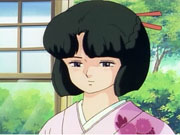 Mitaka is at an age at which he is under enormous family pressure to get married. If he can’t find a suitable bride for himself, his relatives are fully prepared to pick one out for him. In fact, they already have a candidate in mind: Asuna Kujo, the daughter of a very wealthy and very traditional family. Asuna has had a sheltered upbringing and she has some strange, old-fashioned notions. After one look at Mitaka she decides that an arranged marriage might not be a bad idea.
Mitaka is at an age at which he is under enormous family pressure to get married. If he can’t find a suitable bride for himself, his relatives are fully prepared to pick one out for him. In fact, they already have a candidate in mind: Asuna Kujo, the daughter of a very wealthy and very traditional family. Asuna has had a sheltered upbringing and she has some strange, old-fashioned notions. After one look at Mitaka she decides that an arranged marriage might not be a bad idea.
To the modern-minded Mitaka she just seems weird. Worst of all, she keeps a large pack of dogs, all of them with icky-cute names. All of this inspires him to redouble his efforts to win over Kyoko.
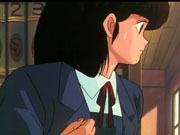 Ibuki Yagami is another high school student who becomes infatuated with Godai. Her approach is more direct than Kozue’s, and much scarier.
Ibuki Yagami is another high school student who becomes infatuated with Godai. Her approach is more direct than Kozue’s, and much scarier.
Jokes
A running gag is that names of the major characters all contain numbers, which in the case of the tenants of Ikkoku-kan are also their apartment numbers.
-
Godai“five ages”
-
Roppongi“six trees”
-
Ichinose“the first rapids/shoal”
-
Yotsuya“four valleys”
-
Otonashi“zero sound” or perhaps “the sound of nothing”
-
Nanao“seven tails”
-
Mitaka“two falcons”
-
Kujo“Ninth Avenue”
-
Yagami“eight gods”


I can’t believe that you watched the whole thing. That’s some real dedication… I can rarely make myself to reach beyond 26 episodes of anything, and I prefer 1-season deals like Haibane Renmei. The only series that kept my interest anywhere beyond 30 episodes was Naruto, of which I saw 136. It was exhausting.
For me it depends on the series. Sometimes a long series will hold my attention, and there are plenty of short ones that I have dropped after one or two episodes.
I’m sure it’s easier to do a good series in a short 13- or 26-episode format. A multi-year series is likely to meander and lose focus. A one-year series is more likely to be carefully planned out and to tell a coherent story.